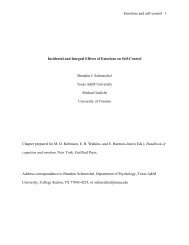A cognitive control perspective of self-control strength - ResearchGate
A cognitive control perspective of self-control strength - ResearchGate
A cognitive control perspective of self-control strength - ResearchGate
Create successful ePaper yourself
Turn your PDF publications into a flip-book with our unique Google optimized e-Paper software.
192 A Cognitive Control Perspective<br />
importance, we suggest that <strong>self</strong>-<strong>control</strong> is probably not special, but rather borrows from<br />
a general-purpose brain-based system related to concern with, monitoring <strong>of</strong>, and remediation<br />
<strong>of</strong> problematic events and behaviors <strong>of</strong> multiple types (Miller & Cohen, 2001).<br />
Relevant evidence for this idea is reviewed below.<br />
An energizer <strong>of</strong> the <strong>cognitive</strong> <strong>control</strong> system is motivation (Sarter, Gehring, & Kozak,<br />
2006). Stated in other terms, if there is low motivation to <strong>control</strong> a problematic tendency,<br />
it is unlikely that the <strong>cognitive</strong> <strong>control</strong> system <strong>of</strong> the prefrontal cortex will be<br />
recruited. This in turn would result in suboptimal performance (Lieberman & Eisenberger,<br />
2005). Thus, one major component to <strong>self</strong>-<strong>control</strong> <strong>strength</strong> is likely one’s willingness to<br />
work hard on a difficult task. There are reasons for thinking that performing one effortful<br />
task is likely to undermine one’s motivation to work hard on a second effortful task.<br />
In other words, depletion effects may be understood in motivational terms. Relevant<br />
evidence for this idea is reviewed below.<br />
Potentially separable from <strong>self</strong>-<strong>control</strong> capacity or even task motivation is what we<br />
term task monitoring. To perform non-habitual tasks well, potential or actual mistakes must<br />
be recognized. In the absence <strong>of</strong> recognizing error-proneness, <strong>cognitive</strong> and behavioral<br />
habits would dominate (Lieberman & Eisenberger, 2005). Although many <strong>of</strong> these habits<br />
would generally serve the <strong>self</strong>, many would not (Bargh & Chartrand, 1999). From this<br />
<strong>perspective</strong>, task monitoring processes are crucial, though not sufficient by themselves<br />
(Kerns et al., 2004), for overriding problematic response tendencies. Self-<strong>control</strong> <strong>strength</strong><br />
and its depletion may thus be reliant on such monitoring processes, a point substantiated<br />
in our review.<br />
The success (versus failure) <strong>of</strong> <strong>cognitive</strong> <strong>control</strong> is primarily a result <strong>of</strong> dlPFC activation<br />
(Kerns et al., 2004) and the processes uniquely implemented by this brain structure<br />
(Knight & Stuss, 2002). Damage to the dlPFC leads to perseverative tendencies and<br />
behaviors, major difficulties in social functioning, and indeed to impaired <strong>self</strong>- and emotion-<strong>control</strong><br />
abilities (Saint-Cyr, Bronstein, & Cummings, 2002). Note that these consequences<br />
<strong>of</strong> dlPFC damage are highly consistent with impaired <strong>self</strong>-<strong>control</strong> as highlighted<br />
by the <strong>strength</strong>-based theory <strong>of</strong> <strong>self</strong>-<strong>control</strong> (Baumeister et al., 2000). Thus, it is suggested<br />
that the recruitment <strong>of</strong> the dlPFC’s resources should play an important role in understanding<br />
whether <strong>self</strong>-<strong>control</strong> will be instantiated or not (Goldberg, 2001). Finally, the<br />
dlPFC is activated in context-specific terms (Miller & Cohen, 2001) and we provide<br />
evidence that <strong>self</strong>-<strong>control</strong> <strong>strength</strong> may be similarly characterized.<br />
Findings in Support <strong>of</strong> the Heuristic Model<br />
One purpose <strong>of</strong> the review is to introduce studies involving <strong>cognitive</strong> <strong>control</strong> measures<br />
and findings that would seem especially germane to understanding how <strong>self</strong>-<strong>control</strong><br />
<strong>strength</strong> works. In addition, a number <strong>of</strong> social and personality psychologists have<br />
adopted and adapted <strong>cognitive</strong> <strong>control</strong> methods in understanding the processing basis <strong>of</strong><br />
<strong>self</strong>-<strong>control</strong> <strong>strength</strong>. Relevant findings <strong>of</strong> this type are reviewed as well. In sum, there is<br />
an emergent potential interface <strong>of</strong> social and <strong>cognitive</strong> <strong>perspective</strong>s on top-down <strong>control</strong><br />
that we sought to highlight.<br />
Self-<strong>control</strong> <strong>strength</strong> in terms <strong>of</strong> task motivation<br />
A first important set <strong>of</strong> studies was reported by Schmeichel (2007). In four studies, he<br />
showed that there appears a close connection between <strong>self</strong>-<strong>control</strong> depletion effects and<br />
<strong>cognitive</strong> <strong>control</strong> processes. Manipulations <strong>of</strong> ego depletion undermined <strong>cognitive</strong> <strong>control</strong><br />
ª 2010 The Authors Social and Personality Psychology Compass 4/3 (2010): 189–200, 10.1111/j.1751-9004.2009.00244.x<br />
Journal Compilation ª 2010 Blackwell Publishing Ltd



